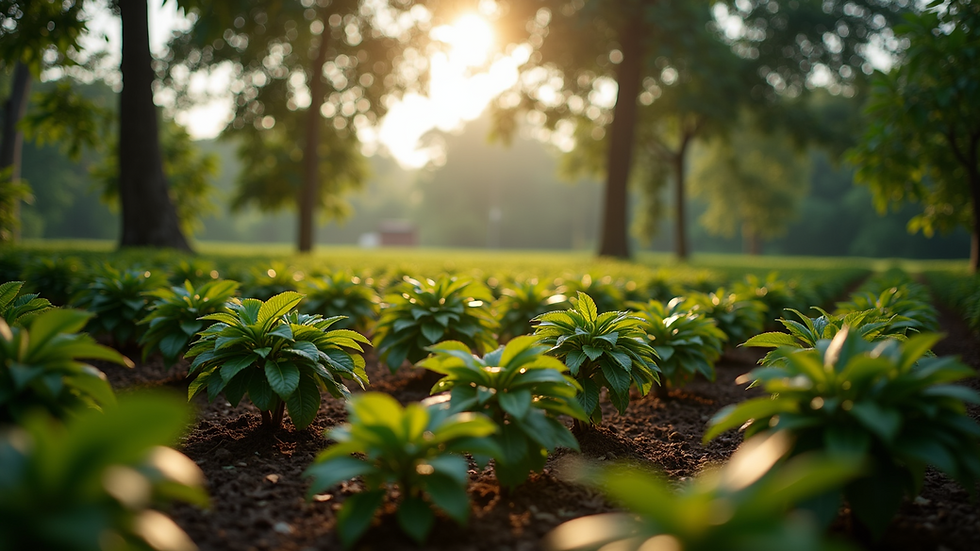An Introduction to Cameroonian Coffee: A Hidden Gem in the World of Coffee
- achille Massoma

- Apr 22, 2025
- 3 min read
Did you know that Cameroon, often celebrated for its rich culture and world-renowned athletes, is also a rising star in the global coffee industry?
Nestled in the heart of Africa, Cameroon is known for its diverse landscapes, volcanic highlands, and thriving agriculture. It has produced champions like Francis Ngannou, Samuel Eto’o, Joel Embiid, and Cédric Ndoumbe, but beyond its athletic legacy lies another prized treasure—Cameroonian coffee.
For coffee enthusiasts, Cameroon offers a unique blend of history, tradition, and exceptional flavors, making its coffee one of the best-kept secrets in the specialty market.

A Coffee Legacy Born in Cameroon
Cameroon’s coffee history dates back to the late 19th century, when German colonizers introduced coffee cultivation. The country’s volcanic soils, high altitudes, and tropical climate made it an ideal region for coffee farming.
Initially, Cameroon focused on producing Robusta coffee, known for its bold, intense flavor and high caffeine content. Grown in the lowland regions, Robusta beans became a staple in both local and international markets.
However, the real transformation of Cameroonian coffee began with the introduction of Arabica beans.
The Rise of Arabica Coffee in Cameroon
In the 1920s, Arabica coffee was introduced in Cameroon’s western highlands, particularly in regions like:
✔ Bamenda
✔ Bafoussam
✔ Dschang
These areas, located at elevations of 1,200 meters (4,000 feet) and above, provided the cooler temperatures and mineral-rich volcanic soil needed to cultivate high-quality Arabica coffee.
Compared to Robusta, Arabica beans offer a smoother, more aromatic flavor profile, often featuring floral, fruity, and chocolatey notes. This diversification positioned Cameroon as a serious player in the specialty coffee market.
Sustainability and Innovation in Cameroonian Coffee
Despite challenges, Cameroon’s coffee industry has continued to evolve, with a strong focus on sustainability and organic farming practices.
🔹 Traditional Farming Methods: Small-scale farmers have passed down eco-friendly farming techniques for generations, ensuring coffee is grown naturally without harmful chemicals.
🔹 Fair-Trade & Cooperatives: Many coffee-growing regions, such as Boyo and Oku, have gained international recognition through fair-trade initiatives, which support farmers and create sustainable income opportunities.
🔹 Quality-Driven Processing: Improved post-harvest techniques, including washed and natural processing methods, have enhanced the overall cup quality of Cameroonian coffee.
These efforts have helped Cameroon’s coffee gain traction in Europe, North America, and Asia, with specialty coffee roasters appreciating its unique taste and ethical sourcing.
Why Cameroonian Coffee Stands Out
What makes Cameroonian coffee different from other coffees?
✅ Rich Terroir: The volcanic highlands of Mount Cameroon, Bamenda, and Bafoussam contribute to complex, layered flavors in every cup.
✅ Balanced Flavor Profile: Cameroonian coffee offers bright acidity, full body, and diverse tasting notes—ranging from nutty and spicy to floral and chocolatey.
✅ Blend of Tradition & Modern Trends: Specialty coffee shops in Douala, Yaoundé, and global markets are now featuring single-origin Cameroonian coffee, increasing its visibility.
Cameroon even hosts the Cameroon International Coffee Festival, a celebration that brings together farmers, roasters, and coffee lovers to showcase the nation’s coffee excellence.
Experience Cameroon’s Coffee with Akoma
Every cup of Cameroonian coffee tells a story of passion, resilience, and craftsmanship. At Akoma Coffee, we are dedicated to bringing this extraordinary coffee to the world, ensuring that every sip reflects the tradition and dedication of the farmers who cultivate it.
Have You Tried Cameroonian Coffee?
We’d love to hear about your experience! Share your thoughts in the comments below.
👉 Explore our collection at: www.akoma-coffee.com




Comments